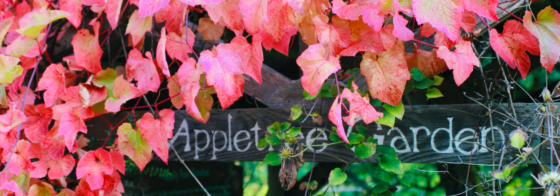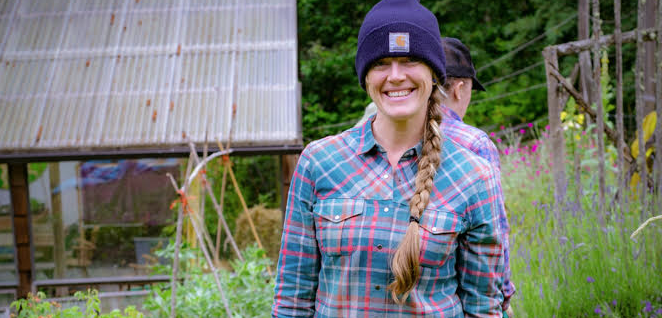I caught Westgarden Steward Jules LeDrew at work, and interviewed her while we transplanted romaine lettuce starts. Here’s our conversation.
—Marnie Jackson
Can you tell me more about your role here at the Whidbey Institute?
There’s a sweet balance between making the garden run smoothly, including every aspect of vegetable and medicinal herb production and cultivation, and building community in this space. That ranges from engaging volunteers to students and everyone in between. My role is also about solidifying the place of the Westgarden within the bigger picture of the Whidbey Institute, and helping draw more people into this amazing resource.
We have our Thursday volunteer tradition, with a morning of garden work and a shared lunch including volunteers and staff. Can you tell me how that’s going?
This has been a key factor in helping the garden become a significant part of the life of the Whidbey Institute. For staff and visitors to regularly visit the garden, and to see a lot of people congregating here on any given day, is significant. For volunteers, participating in our big lunches on Thursday is a great way to feel more involved in the full story of this organization. I’m always amazed by how something as simple as sharing a meal together can have a really big impact on community-building.
We just had our annual Volunteer Days. Can you tell me what that was like from the perspective of the garden?
It was incredible! It’s amazing how much we got done. Volunteers and staff accomplished everything from much needed weeding to flipping beds, adding soil amendments, harvesting food, and harvesting medicine. We built two steps to the entrance of the garden, not only to make it look more accessible and more welcoming from the outside but also to provide people with more limited mobility with safer, easier garden access. The previous Westgarden Steward had wanted a welcoming kiosk, so we accomplished that. She’s still involved as a frequent volunteer and visitor and it’s exciting to have her dream of a garden kiosk come true! It’s significant in how it will help welcome people in, holding printed material about what’s in the garden, how to feel welcome here, how to engage in honorable harvests, plus information about the volunteer schedule, Waldorf kid projects, and upcoming garden events.
Can you tell me more about what’s meant by the term honorable harvest?
Honorable harvest indicates a way of being in relationship with the garden and the plants that’s rooted in reciprocity, gratitude, sensitivity, generosity, and reverence. Instructions on the kiosk will give the ok for people to come in and experience this place in its fullness, plus help them feel comfortable picking and eating things. I want the space to be appreciated, and the most important way to achieve that is to get people interacting with the plants. It’s healing to the body to come in here. Use every sense—touch, hear, smell, see, taste—and know that yes, you’re welcome to take things! For now, I appreciate people checking in before picking any produce, but clear, posted instructions about harvesting will allow visitors to come in and have a great experience with the garden even when I’m not here, including touching and tasting.
Can you share more about your educational and professional background as it pertains to this role?
I’ve been in the natural product industry for over a decade. I grew up in mountains of Colorado and I’ve been a plant geek from day one. I have a special interest in phytochemistry and I’m passionate about education—about sharing my knowledge with others. I began as a self-taught plant person, but got my undergrad education at Bastyr University where I delved deeply into phytochemistry, plant medicine, and pre-med coursework. I’ve been a teacher in essential oils and volatile oils chemistry, medicine making, and skin care. Here, I can use my teaching and plant medicine background to bring all the dynamics of this garden to people of all ages.
Do you offer any special instruction outside of your normal work responsibilities?
I love to have special consultations with groups, and to offer customized courses on herbal medicine, native plant identification, in-depth garden tours and plant introductions. This is such a big space, and the greenhouse provides a great opportunity for garden gatherings year-round. People are welcome to contact me by email for more information on rates for specialized group instruction or to schedule time together.
Can you tell me how the culture of the Whidbey Institute is feeling for you?
Being a member of this team is pretty incredible. It’s the most positive, productive work environment I’ve ever been a part of. This place allows people to show up as they are, and I find that because of this environment a lot more gets done. Clear, timely communication holds a key role, and makes space for all of us to bring our unique differences and commonalities together. When people are offered environments like this that are conducive to holistic health, they’re happier with where they are, with what they’re doing, and in their relationships with the people with whom they work.
What could the Whidbey Institute or our community do better to help the Westgarden reach its fullest potential?
The engagement of volunteers is the most helpful thing—anyone, from skilled gardeners to beginning weeders to builders and carpenters—is welcome come in and help. I also know that having a land and garden intern would be wonderful, but that will require that they have a place to live year-round. Mushroom—our tiny, unwinterized cabin that used to serve as intern housing—has been decommissioned. The Place team is considering what long term plans we can put in place to make internship not only possible, but rewarding for both the organization and the prospective intern.
What would you like to share about your life outside of work?
Outside of work, I tend to be on the active side. I spend most of my free time outside, hiking with friends, and cooking. I’m really into boxing, and I have a sparring group that meets weekly. Most nights, I’m training for that or spending time sustainably harvesting wild medicine. Everything I do outside of work has to do with plants and people—two things that I dearly love. I do love to garden, but I do so less at home now that I have the Westgarden to tend. I medicine-make and sustainably wildcraft at home, and spend my hands-on gardening time here.
What would you like people to know that I’ve not yet asked about?
I love working with kids and supporting education for kids. I love working with Waldorf students as part of my role here, and families and children are always welcome on volunteer days in the Westgarden. I’ve been getting a lot of interest in summer garden camps for children, which might include a foundation in herbal medicine and uses. It would be really great to implement in the future, and I’d be grateful if people would email me if they’d be interested in enrolling a child in a summer 2019 garden camp. This would really help me gauge interest and plan for next year.
I’m also looking for an artist to help illustrate a map of the Westgarden to put on the kiosk, and I encourage anyone with talent in that area to reach out!



Hi…..I may be interested in creating an illustrated map of the Westgarden. I have been taking illustration classes and working on my skills in that area. I am not an expert but I am willing to give it a try and see how you like the results.
I am also hoping to set up a tour of the garden along with a short educational presentation for the South Whidbey Garden Club. We are in the process of getting our monthly calendar of speakers and events set up for September through June 2019. I would like to connect with Jules by email or phone to see if that can happen. Thanks so much.
Thanks Susan! I’ll ask Jules to reach out to you! —Marnie